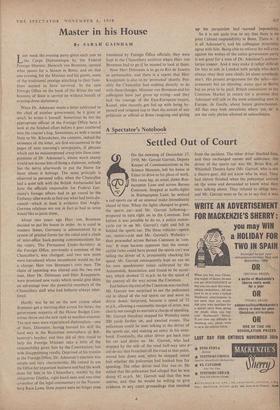Master in his House
By SARAH GAINHAM LAST week the evening party given each year to the Corps Diplomatique by the Federal Foreign Minister, Heinrich von Brentano, opened what passes for a Season in Bonn; and on that one evening, for the Minister and his guests, some of the traditional prestige attaching to their func- tions seemed to have survived. In the new Foreign Office on the bank of the Rhine the real business of State is carried on without benefit of evening-dress diplomacy.
When Dr. Adenauer wants a letter addressed to the chief of another government, be it great or small, he writes it himself. Sometimes he lets the - appropriate official of the Foreign Office have a look at the finished effort before it goes unaltered into the courier's bag. Sometimes, as with a recent Note to Mr. Khrushchev, the contents, indeed the existence of the letter, are first encountered in the pages of next morning's newspapers.• If phrases which can be misinterpreted creep into these com- positions of Dr. Adenauer's, whose worSt ehemy would not accuse him of being a diplomat, nobody has the nerve afterwards to put the blame for them where it belongs. The same principle is observed in personal talks; when the Chancellor had a quiet talk with the British Ambassador last June the officials responsible for Federal Ger- many's foreign affairs had to go round to the Embassy afterwards to find out what had been dis- cussed—which at least is evidence that Anglo- German relations are not in fact as bad as some would like to paint them.
About two years ago Herr von Brentano decided to put his house in order. As is usual in modern States, Germany is administered by a system of printed forms for the ruled and a chain of inter-office buck-passing communications for the rulers. The Permanent Under-Secretary at the Foreign Office, previously a nominee of the ' Chancellor's, was changed; and two new posts were introduced whose incumbents would be, for a change, Herr von Brentano's own men. The chain of reporting was altered and the two new men, Herr Dr. Dittmann and Herr Knappstein, were promised new ranks which would give them an advantage over the powerful members of the Chancellory staff who had hitherto always inter- fered.
Hardly was he set on the new course when Brentano got a warning shot across his bows; the government majority of the House Budget Com- mittee threw out the new rank as needless expense. The new men were experienced diplomatists—one of them, Dittmann, havigg learned his skill the hard way in the Byzantine atmosphere of Rib- bentrop's heyday; and they did all they could to help the Foreign Minister take a little of the responsibility given him by the Constitution; but with disappointing results. Deprived of his trusties at the Foreign Office, Dr. Adenauer's reaction was simple and very characteristic. He ceased to use the Office for important business and had the work done for him in his Chancellory, mainly by the ubiquitous Globke, right-hand man and one-time co-author of the legal commentary to the Nurem- berg Race Laws. State papers were no longer even translated by Foreign Office officials; they were kept in the Chancellory archive's where Herr von Brentano had to go if he wanted to look at them.
Now Herr Dittmann is to go to Rio de Janeiro as ambassador, and there is a report that Herr Knappstein is also to be 'promoted' shortly. Pos- sibly the Chancellor had nothing directly to do with these changes. Minister von Brentano and his colleagues have just given 'up trying—and they lack the courage of the East-European expert, Kessel, who recently _got fed up with being by- passed and resigned (up to then the notion of any politician or official at Bonn resigning and giving up his perquisites had seemed impossible).
So it is not quite true to say that there is no joint Cabinet responsibility in Bonn. There is : it is all Adenauer's; and his colleagues invariably agree with him. Being able to enforce his will even against the wishes of the entire government party is not good for a man of Dr. Adenauer's authori- tarian temper. And it may make it rather difficult for him to talk in London with people who don't always obey their own chiefs, let alone somebody else's. His present programme for the talks—dis- armament but no thinning; status quo at Berlin but no price to be paid; British concessions to the Common Market in return for a promise that Adenauer will talk to the most unbending man in Europe, de Gaulle, about future protectionism. All that may look unrealistic where 'yes, sir' is not the only phrase alldwed to subordinates.






































 Previous page
Previous page